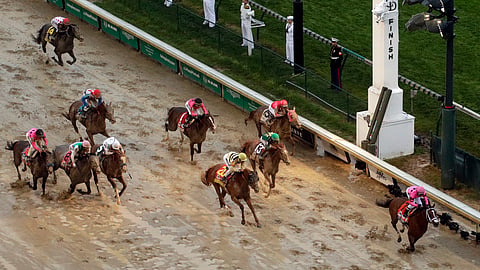

The news that broke Monday morning is the biggest story in horse racing in years, maybe even in decades. An industry that has become quite adept at damage control had a more pressing need for it than ever, as the indictment handed down by the FBI alleges a conspiracy of cheating that is pervasive and goes to the sport's highest level. It's yet another scandal for a sport that has seemingly seen nothing but bad news over the past year, with horses dying on the track, a controversial disqualification in the sport's biggest race, and an unrelenting attack by animal-rights advocates who want the sport banned. When the reports first started to come out on Monday morning, our first thought that was that this would be another black eye for a sport that doesn't need one.
But as the day wore on, the nature of the story seemed to shift, at least for us. It was not because we were surprised by the news -- far from it, in fact. Anyone with even a casual interest in horse racing, or in betting on it, was well aware, even before today of the following things:
Most trainers are honest, but a sizable minority of them, the so-called "supertrainers," cheat by giving performing-enhancing drugs (PEDs) to their horses.
The crooked trainers have devised PED regimens that regulators cannot test for. The cheaters are ahead of the enforcers, and have been for a long time.
Too many owners are more than happy to employ the cheaters, presumably because they like winning races.
It has been obvious for decades that when it comes to horse racing, drugs are everywhere, and they are ruining the game. It used to be that handicappers would wonder if a horse could stretch out from a sprint to a route, or go from dirt to turf; now handicappers have to be tuned in to which trainers have "the juice," and which do not. It also seems likely that the recent spike in the number of horses dying on the track is related to PEDs: Pain is the horse's natural warning system, and drugs screw that up. PEDs allow horses to keep running until they drop dead on the track.
On the surface, what happened today is awful: drugged and dead horses, and crooked, greedy horse trainers abusing them for profit. Why, then, do I feel pretty good about it? Because I think this is a Black Sox moment for horse racing: This is an existential threat to the sport, and that may finally enable the kind of massive changes that it has needed for a long time, but which institutional inertia has made impossible to implement.
All race-day medication, including the anti-bleeding medication Lasix, must be banned.
Racing regulations, including takeout rates, need to be unified across racing jurisdictions.
There needs to be an individual -- call the person a commissioner, a czar, a Grand Poobah, whatever -- who has real power, and who has the ability to act in the best interest of the sport as a whole. The days when a trainer caught administering PEDs got a slap on the wrist, or a punishment that is an outright joke, like letting the trainer's horses run under an assistant trainer's name, must end.
Since most PEDs must be administered close to race time, horses at every level, at every track, must be quarantined, and placed under human surveillance, for at least 24 hours prior to racing to prevent cheating.
This is just the stuff I can think of off the top of my head. All of these changes were a pipe dream yesterday, but after the FBI raid , they seem possible. And that gives us at least a bit of hope for the sport, and it should give hope also to anyone who cares about horses.
And it also creates a clear opportunity, a clear fork in the road: If horse racing fails to improve itself, if the sport falls back on the same way it has been doing business forever, then the sport will cease to exist. And if that happens, it will have earned its extinction on merit.